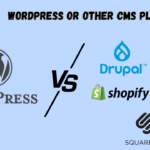In today’s fast-paced digital landscape, having a strong online presence is no longer optional for businesses—it’s essential. While websites and social media profiles are important, there’s one tool that’s becoming increasingly crucial for success: mobile apps. In this blog post, we’ll explore why your business needs a mobile app and how it can drive growth, enhance customer engagement, and give you a competitive edge in your industry.
The Mobile-First World
Before diving into the benefits of mobile apps, let’s consider the current digital environment. According to recent statistics:
- There are over 6.8 billion smartphone users worldwide
- Mobile devices account for more than 55% of global web traffic
- Users spend an average of 4-5 hours per day on their mobile devices
- Mobile app downloads are projected to reach 255 billion by the end of the year
These numbers paint a clear picture: we’re living in a mobile-first world. Your customers are on their smartphones, and that’s where your business needs to be.
Enhanced Customer Engagement
One of the primary advantages of having a mobile app is the ability to engage with your customers directly and personally. Here’s how:
- Push Notifications: Send targeted messages about promotions, updates, or personalized offers directly to your customers’ devices.
- In-App Messaging: Provide real-time customer support and foster communication within the app environment.
- Personalization: Tailor the user experience based on individual preferences, behavior, and purchase history.
- Loyalty Programs: Implement digital loyalty cards and rewards systems that are easy for customers to track and redeem.
By leveraging these features, you can create a more interactive and engaging experience for your customers, leading to increased loyalty and retention.
Improved Customer Service
A mobile app can significantly enhance your customer service capabilities:
- 24/7 Availability: Provide information, support, and services round the clock without the need for constant human intervention.
- Self-Service Options: Allow customers to find answers to common questions, track orders, or make appointments without contacting support.
- Feedback Collection: Easily gather customer feedback and ratings to improve your products or services.
Increased Brand Visibility and Recognition
Having your app icon on a customer’s device serves as a constant reminder of your brand. Even when they’re not actively using the app, seeing your logo regularly reinforces brand recognition. This subtle but persistent presence can lead to:
- Higher brand recall
- Increased likelihood of repeat purchases
- Word-of-mouth recommendations
Competitive Advantage
In many industries, having a mobile app is still not the norm. By developing one, you can:
- Stand out from competitors
- Offer unique features and services
- Attract tech-savvy customers
- Demonstrate innovation and forward-thinking
Data Collection and Analytics
Mobile apps provide valuable insights into your customers’ behavior, preferences, and needs. This data can help you:
- Refine your marketing strategies
- Improve your products or services
- Make data-driven business decisions
- Personalize user experiences
New Revenue Streams
A well-designed mobile app can open up new revenue opportunities:
- In-App Purchases: Offer premium features, digital products, or exclusive content.
- Mobile Commerce: Provide a seamless shopping experience for your products or services.
- Subscription Models: Implement recurring revenue streams through app-based subscriptions.
- Advertising: Monetize your app through targeted advertising if appropriate for your business model.
Improved Efficiency and Productivity
Mobile apps aren’t just for your customers—they can also streamline internal processes:
- Employee Apps: Develop internal apps for communication, project management, or resource allocation.
- Field Service Apps: Equip your mobile workforce with tools for scheduling, reporting, and customer information access.
- Inventory Management: Use apps to track stock levels, manage orders, and optimize supply chain operations.
Building a Direct Marketing Channel
A mobile app serves as a direct channel between your business and your customers:
- Bypass email filters and ad blockers
- Deliver timely and relevant information
- Create a more personal connection with your audience
- Gather valuable first-party data for marketing purposes
Preparing for the Future
As technology continues to evolve, having a mobile app positions your business for future innovations:
- Integration with Emerging Technologies: Be ready to incorporate AR, VR, AI, or IoT features as they become more mainstream.
- Adaptation to New Devices: Easily extend your app to wearables, smart home devices, or whatever comes next.
- Evolving Customer Expectations: Meet the growing demand for mobile-first experiences and services.
Conclusion: The Time to Act is Now
In 2024, a mobile app is no longer a luxury—it’s a necessity for businesses looking to thrive in the digital age. From enhancing customer engagement and improving brand visibility to opening new revenue streams and preparing for future technologies, the benefits of having a mobile app are clear and numerous.
However, developing a successful mobile app requires expertise, strategy, and ongoing maintenance. That’s where c3digitus comes in. With our mobile app service, we can help you conceptualize, design, develop, and launch an app that aligns with your business goals and resonates with your target audience. Contact us today to learn how we can help you create a mobile app that will drive growth, engage customers, and position your business for long-term success in the digital marketplace.




